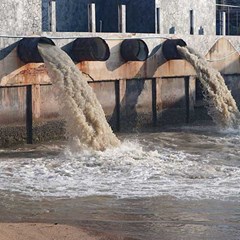Industrial Waste Water Treatment-- Improve Effectiveness with Custom-made Water Treatment Equipments
Industrial Waste Water Treatment-- Improve Effectiveness with Custom-made Water Treatment Equipments
Blog Article
Innovations and Developments in Industrial Waste Water Treatment Technologies
The landscape of commercial wastewater treatment is undergoing a transformative shift, driven by developments that improve both effectiveness and sustainability. As regulatory requirements advance, the combination of AI and equipment knowing right into wastewater management systems assures to ensure and improve procedures conformity.
Review of Drainage Treatment Technologies
Wastewater therapy innovations incorporate a variety of methods created to get rid of impurities from commercial effluents before their release right into the environment. These innovations are crucial for keeping environmental balance and ensuring compliance with ecological policies. The key classifications of wastewater treatment consist of physical, chemical, and biological techniques, each offering unique purposes based upon the nature of the impurities existing.

Organic therapy approaches employ bacteria to weaken raw material, making them particularly reliable for organic-rich effluents. Techniques like activated sludge and biofilm reactors harness the natural deterioration capabilities of bacteria, causing considerable reductions in biochemical oxygen need (BODY)
Advanced Filtering Techniques
Advanced filtering strategies represent a vital development in the world of industrial wastewater therapy, boosting the efficiency of pollutant removal processes. Industrial Waste Water Treatment. These techniques incorporate a range of modern technologies, including microfiltration, ultrafiltration, nanofiltration, and reverse osmosis, which supply consecutive obstacles for different bit sizes and chemical structures
Microfiltration and ultrafiltration utilize membrane systems to remove suspended solids, microorganisms, and bigger natural particles, enhancing the high quality of effluent prior to further therapy. Nanofiltration links the void between ultrafiltration and reverse osmosis, effectively removing natural compounds and divalent ions, thus reducing the lots on downstream procedures.
Reverse osmosis provides the highest degree of filtration by enabling only water and tiny particles to go through its semi-permeable membranes, making it ideal for redeeming high-grade water from commercial effluents. Recent advancements in membrane layer innovation, including the growth of more fouling-resistant and sturdy materials, have actually significantly boosted operational performance and minimized costs.
Including these sophisticated purification methods not only improves the overall therapy process but also contributes to sustainability initiatives by making it possible for water reuse and resource recuperation in industrial setups. (Industrial Waste Water Treatment)
Biological Therapy Innovations

Moreover, the advancement of engineered organic systems, such as membrane bioreactors (MBRs), incorporates organic treatment with innovative membrane filtration. This assimilation permits greater effluent high quality and decreased impact, making it appropriate for space-constrained industrial centers. Innovations in genetically crafted microorganisms have actually likewise arised, improving the biodegradation of specific pollutants, such as pharmaceuticals and hefty steels, that are generally challenging to eliminate.
Additionally, the application get redirected here of bioaugmentation strategies, where helpful microorganisms are presented to enhance the existing organic therapy processes, has actually shown appealing cause enhancing treatment efficiency. These innovations collectively indicate a trend in the direction of even more sustainable and effective biological therapy methodologies that can adapt to the advancing complexities of industrial wastewater streams. As sectors proceed view publisher site to prioritize environmental conformity, these organic innovations will play an essential role in wastewater management.

Source Healing Methods
In commercial settings, the assimilation of source recovery approaches has become significantly crucial for enhancing sustainability and decreasing waste. These techniques concentrate on drawing out valuable products and energy from wastewater streams, therefore transforming possible contaminants right into recyclable sources.
One popular strategy is nutrition recuperation, where nitrogen and phosphorus, commonly present in excess in wastewater, are recorded and converted right into fertilizers. This not just reduces environmental influences but additionally provides a round economic situation service for farming applications. Additionally, innovations such as anaerobic food digestion enable the conversion of natural waste right into biogas, a sustainable power resource that can offset fossil gas usage in industrial operations.
Moreover, progressed filtration and membrane modern technologies facilitate the healing of commercial byproducts such as metals and salts. These recuperated products can be reintegrated into production procedures, lowering the need for virgin resources.
Future Patterns in Waste Water Administration
As sectors increasingly prioritize sustainability, the future of wastewater management is set to go through considerable makeovers. Technical advancements, such as synthetic intelligence and maker discovering, will certainly make it possible for extra efficient monitoring and management of wastewater systems. These technologies can predict maintenance needs, optimize treatment procedures, and improve decision-making, ultimately minimizing functional prices and ecological effect.
Additionally, the assimilation of round economic climate principles will play an important function in wastewater administration. Industries are expected to shift in the direction of systems that not just deal with wastewater however also recover valuable sources, such as nutrients, water, and power. This shift will minimize waste and advertise the reuse of products, lining up with global sustainability objectives.
Arising treatment techniques, such as membrane layer bioreactors and progressed oxidation processes, will better improve the efficiency of wastewater treatment, permitting for better effluents ideal for reuse. In addition, regulative frameworks are most likely to develop, emphasizing more stringent standards for wastewater discharge and motivating markets to adopt cutting-edge treatment remedies.
Final Thought
In final thought, the advancement of industrial wastewater treatment innovations shows a significant shift towards improved performance and sustainability (Industrial Waste Water Treatment). Innovations in sophisticated filtering strategies, organic treatments, and resource recovery techniques highlight the market's dedication to ecological stewardship.
The landscape of commercial wastewater therapy is undergoing a transformative shift, driven by developments that improve both effectiveness and sustainability.Wastewater therapy modern technologies incorporate an array of approaches designed find to remove contaminants from industrial effluents before their release into the environment.Harnessing the power of biological processes has actually led to substantial innovations in the therapy of commercial wastewater.In addition, the execution of bioaugmentation approaches, where valuable germs are presented to boost the existing organic treatment processes, has revealed encouraging outcomes in enhancing treatment performance. These technologies jointly symbolize a pattern towards more lasting and reliable organic therapy methods that can adapt to the evolving intricacies of commercial wastewater streams.
Report this page